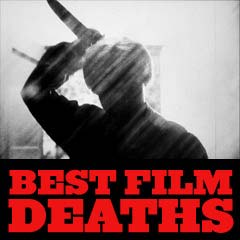
|
Deaths Scenes 1989 |


|
The Abyss (1989) Writer/director James Cameron's sci-fi underwater adventure film told about a top-secret recovery operation during the Cold War, when an American ballistic nuclear submarine the Montana was ambushed and sank in deep Caribbean Sea waters after encountering an alien species. Civilian workers at a nearby underwater oil drilling rig, including ex-married petroleum engineers, were enlisted to help a number of gung-ho Navy SEALS to locate and investigate the cause of the crash:
In one of the tensest near-death scenes ever filmed, Lindsay drowned when she sacrificed her life to save her estranged husband Bud. The two of them were caught in their damaged submersible with only one diving suit, and she decided to give up her life. Once he returned to the platform, he revived her in a dramatic, emotionally raw, nerve-wracking resuscitation scene through his sheer force of will and determination, even though he was told "It's all over." He was not satisfied, and asserted:
He used a combination of methods: heart-shocks, pounding on her chest, screaming at her, slapping her, crying, and CPR mouth-to-mouth resuscitation, until she gasped and took a breath. |
     Brought Back to Life After Drowning |
||||||

|
Always (1989) In this remake of the WWII-era romantic drama A Guy Named Joe (1943), Pacific Northwest airborne daredevil forest firefighter Peter Sandich (Richard Dreyfuss) was prophetically warned by his troubled girlfriend Dorinda Durston (Holly Hunter) that his risky and dangerous occupation might one day catch up with him:
When he claimed he was having "fun," she lashed out:
After Dorinda had expressed her fears, he told her that he was considering taking a safer training job in Flat Rock, Colorado, but then the phone fatefully rang. It was his day off, but he volunteered to fight a "new burn on the South Rim." He heroically saved the life of his best friend Al Yackey (John Goodman), whose left engine caught fire from the blazing forest fire (Al radioed to Pete: "My engine's on fire! Can you believe that? And I was in such a good mood!...I think I'm screwed"). Pete swooped down in a steep dive and doused the engine's flames with fire retardant. But then he found himself unable to pull up and avoid flying into flames - and one of his own engines caught fire. Miraculously, he seemed to save himself as he leveled off, while Al prematurely exclaimed: "Oh, that lucky son-of-a-bitch!" Pete knowingly smiled across at his pal Al, flying closeby, realizing that one of his own plane engines was also in flames. Suddenly, his plane exploded in mid-air, and Al watched in shocked amazement as his friend perished. Later, Al spoke to Dorinda about his faithful friend:
|
 Al Yackey (John Goodman) Saved   Pete to the Rescue  Pete's Final Smile  Pete's Plane Exploding in Mid-Air  Al's Shock |
||||||
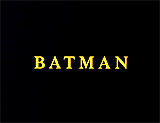
|
Director Tim Burton's version of the Batman comic-book saga told about the rise of a new villain in Gotham City. The former Jack Napier, the right-hand man of king-pin crime boss Carl Grissom (Jack Palance), fell into a vat of greenish, acidic toxic chemicals in a factory. He schemed to spread a reign of terror over the city after becoming transformed and disfigured, and he now called himself the Joker (Jack Nicholson). He vowed:
He prepared to subdue all of Grissom's men by 'greasing' them and by intimidation, to take over his empire. In a roundtable scene with the city's other gangsters, he was questioned by oily gangster Antoine "Tony" Rotelli (Edwin Craig), who asked: "What's with that stupid grin?", as the Joker responded: "Life's been good to me." When Tony rose in his seat and challenged him: "What if we say no?", the Joker approached amiably and offered a handshake:
The startling death scene occurred when they shook hands and Tony was fried with the Joker's electrified hand-shake joy buzzer concealed in his palm. Smoke rose from their clapsed hands and from Rotelli's collar, as the Joker laughed:
Tony's body caught on fire. When his charred and blackened corpse fell back into a chair, the Joker blew on the hot buzzer to cool it off as he quipped: "Antoine got a little hot under the collar." When accused of being "crazy," the Joker added: "Haven't you ever heard of the healing power of laughter?" |
 Antoine "Tony" Rotelli  The Joker's Grin  The Lethal Handshake |
||||||

|
In the conclusion, the Dark Knight/Batman (aka Bruce Wayne) (Michael Keaton) confronted the villainous Joker (Jack Nicholson), and attacked him after being greeted:
The black-caped crusader vowed to kill the Joker for murdering his parents. After a long fight together as the two doppelgangers faced off (in a scene reminiscent of Metropolis (1927)), Batman and love interest/reporter Vicki Vale (Kim Basinger) found themselves dangling from the ledge of the belltower. After quipping, "Well, it's time to retire. Feel free to drop in. Sometimes, I just kill myself," the Joker found himself barely hanging onto his own rescue helicopter's rope ladder, with his right leg bat-hook-connected to one of the cathedral's heavy stone gargoyles. When the gargoyle broke off in mid-air as he was pulled upward, the Joker's leg became weighted down and he could no longer hold onto the rope ladder - he let go. Meanwhile, Batman saved Vicki from falling, and they swayed together in each other's arms at the end of a tether. There was the macabre sight, after the Joker's fall, of his still-grinning face as he lay dead. He was splayed on his back on the church's front steps many stories below. A toy (in proxy for the villain) laughed maniacally in his pocket. |
    The Joker's Still-Grinning Face in Death |
||||||
 |
Dead Calm (1989, Australia) This was a taut Australian erotic thriller from director Phillip Noyce. A married, vacationing couple were seen on their yacht, the Saracen, sailing in the calm Pacific waters off the coast of Australia:
They were traveling to escape from their family's tragedy, along with their dog Ben. They rescued Hughie Warriner (Billy Zane), who was found drifting in the middle of the ocean, not knowing that he was a terrorizing, homicidal psycho. The frantic Hughie claimed that he had survived a sinking black schooner named Orpheus after everyone died from salmonella poisoning. [The mass murderer had actually slaughtered the crew on the vessel.] John left the castaway with his wife, while he took a dinghy to the Orpheus to investigate the claims - finding himself on a sinking craft and in danger of drowning himself. Meanwhile, the unstable and domineering Hughie kidnapped Rae and began sailing off. After a long series of struggles, it was thought that John and the resourceful Rae had finally conquered Hughie by wounding him with a harpoon, knocking him unconscious, tossing him onto a rescue raft, and setting him adrift. But then after they saw his free-floating raft in the open sea, Rae sank it with two flare-gun shots, although a panning shot to the other side of the boat where a rope dangled into the water hinted that Hughie was possibly alive and had climbed on board. The next morning, Rae returned to the deck after a swim, where her husband helped to rinse her hair of the salt water, and shampoo her hair. He left the deck for awhile, as she put her head back and closed her eyes. When a pair of dirty hands resumed the shampooing some time later, she fantasized what she would like:
Suddenly, she realized that the hands belonged to the vengeful Hughie, who had reappeared in the startling shock 'return-from-the-dead' twist ending. He attempted to cover her mouth to stifle her screams, and to strangle her. As John reappeared with a beautifully-prepared breakfast tray, he saw the 'silhouetted' struggle occurring behind the sail. He dropped the tray, grabbed a flare gun, and aimed it at Hughie. The fiery flare tore through the sail, struck Hughie in the mouth, exploded, and forcefully propelled him backwards off the deck into the ocean. Presumably, he was now dead, floating away face-down, as the relieved couple hugged each other.
|
   Rae's Hair Shampooing on Deck - by Hughie!  The Relieved Couple: John and Rae |
||||||
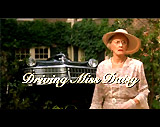
|
Driving MIss Daisy (1989) Bruce Beresford's Best Picture-winning drama told of the long friendship between:
While Miss "Daisy" was playing Mahjong with friends in her living room, her longtime African-American maid Idella (Esther Rolle) was in the kitchen with Hoke. Both were watching the long-running, CBS and ABC-TV daytime soap The Edge of Night (1956-1984), airing at 4 pm each weekday, while she was shucking peas. [Note: The episode was # 1326 with an original airdate of May 1, 1961.] The dialogue between the two soap characters in the scene, the finale of the half-hour show, was between Teresa Vetter (Rebecca Sand) and DA Austin Johnson (Lawrence Weber), in his office in the Monticello County Courthouse. He was cautioning that defense counsel Mike Carr (John Larkin) would call her as a witness and "carve" her into pieces, and he was urging Teresa to confess to the murder of Victor Carlson. She countered by threatening to scandalously divulge the fact that they were having an affair, which would end Austin's marriage to his wife Constance (Elizabeth Lawrence) and his chances of becoming governor:
[Note: On trial was Judy Marceau (Joan Harvey) - wrongly accused of the murder. In the end, the case was dismissed against Judy Marceau, when Mike Carr proved that Teresa Vetter was the real killer.] Idella's sad and quiet death (in 1963 in the film) was depicted by her suddenly dropping the entire bowl of peas to the floor, when Hoke re-entered the kitchen (after delivering cake to the guests in the other room), and asked about what he had missed in the program:
He then noticed something was wrong:
|
   The Edge of Night    Hoke: "Idella? Idella?" |
||||||

|
Glory (1989) Edward Zwick's war film told about the struggles of the US' first, all-black regiment - the 54th Massachusetts Volunteer Infantry, commanded by Robert Gould Shaw (Matthew Broderick). The movie climaxed with their final, suicidal Civil War battle assault in July, 1863 on the impregnable Fort Wagner near Charleston, South Carolina. The attack failed but ultimately turned the tide of the war, although the fort was never taken. Over half of the soldiers in the all-black volunteer regiment died during their fierce assault on the fort. Commander Shaw rallied to lead a last-ditch charge over the parapet, calling out: "Come on, 54th!", but he was shot multiple times before dying in full view of his troops. Members of his regiment were stunned that he had been killed, and were frozen in place. Inspired by Shaw, Pvt. Trip (Denzel Washington) surged forward, lifted up the Union flag, yelled back to his comrades: "Come on!", and took over as their regiment's standard bearer. As he withstood a hail of bullets for a few moments, he too succumbed, but kept the flag upright even in his own death. The film's final image was of Shaw's burial in a mass beach grave with his soldiers (including Trip next to him). |
  Shaw's Heroic Death    Trip: "Come on!"  Commander Shaw's Burial |
||||||
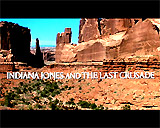
|
Indiana Jones and the Last Crusade (1989) This third installment in the adventure film franchise by director Steven Spielberg, set two years after Raiders of the Lost Ark (1981), was about the search for the Holy Grail - the precious Biblical goblet (with legendary magical powers of eternal life) from Christ's Last Supper. It was learned that the immortal Grail guardian Knight (Robert Eddison) had hidden the real sacred Grail among lots of other glittering cups. In the supernatural showdown, there was a choice of Grails to drink from to attain eternal life. The Knight advised Nazi sympathizer Walter Donovan (Julian Glover): "Choose wisely." Dr. Elsa Schneider (Alison Doody) chose what she believed was the true Grail - a solid gold, emerald-encrusted goblet. She tricked Donovan into drinking from this false Holy Grail cup. He drank and then realized something was wrong ("What is happening to me?"). His hair suddenly sprouted, and he quickly perished from immediate decomposition when his body aged rapidly. His skeletal remains shattered and disintegrated into dust. [Note: The rapid disintegration of the villainous character through rapid aging, known as the "Donovan's Destruction Sequence," was considered the first all-digital composite shot (with no cutaways) in Hollywood history.] The Knight calmly observed that it was the wrong cup:
After Donovan died, Elsa told Indy: "It would not be made out of gold" as he selected a different chalice - a simple, worn, earthen-ware cup of a humble carpenter. Indy drank from it and was told by the Knight:
|
    
The Deadly Transformation of Nazi Walter Donovan: "He chose poorly" |
||||||
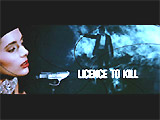
|
The 16th official Bond film starred Timothy Dalton (in his second and last performance) as 007 agent James Bond. The title of the film referred to the official permission granted by the government to an agent operative to use lethal force. There were quite a few shocking, dark and violent moments in the film, including impalement by rape and murder, mutilation and maiming by shark, head exploding, shredding, and inflagration. Bond and his female 'Bond girl' assistant Pam Bouvier (Carey Lowell) both battled the protagonist:
In a 'sting' operation, Bond and Pam had convinced Sanchez that he was being double-crossed by his associate Milton Krest (Anthony Zerbe), the head of a marine research center. When Krest actually told the truth about how $5 million of drug money had been stolen from him (by Bond), suspicions increased when Sanchez found the money (planted by Bond and Pam) in the vault of Krest's own marine vessel the WaveKrest. Sanchez wrongly believed that Krest had ripped off the money and then used it to pay an assassin to kill him. Outraged, Sanchez tossed Krest into the hyperbaric diving chamber and turned up the pressure, then suddenly cut the intake hose to depressurize it, causing his head to explode. When asked about the money (now splattered with blood) by his guards, Sanchez ordered: "Launder it." |
  Krest's Exploding Head in Hyperbaric Diving Chamber |
||||||

|
Another gruesome death involved bad guy Franz Sanchez' (Robert Davi) crazed and deadly henchman Dario (Benicio Del Toro in an early role). During a laboratory tour that Sanchez was conducting for Hong Kong associates buying into his drug empire, Dario recognized Bond from an earlier bar brawl in Bimini (the West Indies) and held a gun at his back. When Bond was identified as an enemy, Sanchez ordered Bond's legs and hands to be tied before putting him on a conveyor belt carrying bricks of cocaine to be shredded into powder. As Sanchez escaped with some of his men and everyone else fled in different directions, Bond was held back from falling into the crusher by only the rope tied around his hands. Dario used his knife to slice through the rope, when Bond girl Pam Bouvier (Carey Lowell) appeared. Dario laughed at her, thinking he had killed her earlier: "You're dead." She pulled out her own concealed gun and shot Dario ("You took the words right out of my mouth"), and saved Bond from death. Bond grabbed Dario's boot and he tumbled into the conveyor and into the chute, momentarily saved by dangling from Bond's legs. At first, the shredder chewed up his legs, then he was reduced to chopped flesh as his entire body was consumed. Bond yelled up to Pam:
|
  Bond Saved  Dario Shredded in Conveyor Belt Chute |
||||||

|
The last Bond kill in the 1989 film was during a final fight to the death atop an oil tanker between Bond (Timothy Dalton) and machete-wielding villain Felix Sanchez (Robert Davi). When the tanker lost its brakes (and the driver bailed out), it careened down an incline and overturned. Sanchez was soaked with gasoline and Bond was seriously injured. Bond was about to be hacked to death by Sanchez' machete, as the villain mocked:
Bond rejected the idea and then asked if Sanchez wanted to know why he rejected being part of his drug empire:
To answer his own question (and explain his own personal vengeance), Bond pulled out the engraved cigarette-lighter wedding gift given to him earlier by his dismembered friend Felix Leiter (David Hedison). He set Sanchez ablaze. Sanchez' flaming body caused the remaining leaked gasoline to explode. |
   Sanchez' Inflagration |
||||||

|
Pet Sematary (1989) This supernatural-psychological and creepy horror thriller directed by Mary Lambert was based on writer Stephen King's 1983 novel. The melodramatic backstory of the main plot involved the mad, diseased sister of the main character Rachel Creed (Denise Crosby as adult), who was continually haunted, traumatized and tormented by her dead sister, Zelda. Seen in flashback, emaciated, terminally-ill and crippled Zelda Goldman (Andrew Hubatsek - a man playing a female's part) was being cared for all alone by her younger 8 year-old sister Rachel (Elizabeth Ureneck as child). Rachel described Zelda's death night - a frightening scene set in a back bedroom, where young Rachel was feeding Zelda (who was suffering from a case of spinal meningitis) - the family's 'dirty secret':
Suddenly, the deformed Zelda spun her entire head around and choked herself to death. Rachel also told how she was worried that her parents would come home and blame her for choking her sister, since she wasn't seen crying afterwards, but laughing, and had obviously wanted her sister dead.
After her death, Zelda continually haunted her sister Rachel with double threats:
|
 Rachel (Denise Crosby) Describing Zelda's Death Night - as Flashback   8 yr-old Rachel Feeding Zelda    Zelda's Choking Death |
||||||
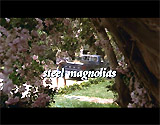
|
Steel Magnolias (1989) Director Herbert Ross' comedy-drama ensemble film was about a small-town group of six tough, strong-willed southern women who coped with grief and supportively survived together through their trials. Alive only on a life-support machine in a hospital after septic shock (due to a failed kidney transplant), diabetic daughter Shelby Eatenton Latcherie (Julia Roberts) was comatose in the hospital. Shelby had chosen to have children, knowing the risk due to her serious case of diabetes and general lack of good health. But her condition had deteriorated after the birth of a son, due to failing kidneys (and even the rejection of a transplanted kidney donated by her mother). Shelby finally passed away when her husband Jackson Latcherie (Dylan McDermott) decided to pull the plug. He signed papers on a clipboard to allow euthanasia. After the simple push of an on-off switch, a doctor removed Shelby's respirator mouthpiece. Jackson gave Shelby a final goodbye kiss, as the camera lingered on a heart monitoring display. Her faithful, overprotective, and strong-willed mother M'Lynn Eatenton (Sally Field) grieved at the foot of the bed. Afterwards, M'Lynn Eatenton delivered an hysterical, despairing ranting at the gravesite, breaking down as she sobbed, mourned and asked: "I Wanna Know Why!":
|
 Shelby's Euthanasia  Mother M'Lynn's Grief 
Gravesite Rant: "I Wanna Know Why!" |
||||||
(chronological by film title) Intro | 1915-1929 | 1930-1933 | 1934-1938 | 1939 | 1940-1942 | 1943-1945 | 1946-1947 | 1948-1949 1950-1952 | 1953-1955 | 1956-1957 | 1958-1959 1960-1961 | 1962-1963 | 1964-1966 | 1967-1968 | 1969-1970 1971 | 1972 | 1973 | 1974 | 1975 | 1976 | 1977-1978 | 1979 1980 | 1981 | 1982 | 1983 | 1984 | 1985 | 1986 | 1987 | 1987 | 1988 | 1989 1990 | 1991 | 1992 | 1993 | 1994 | 1994 | 1995 | 1995 | 1996 | 1997 | 1998 | 1998 | 1999 2000-2001 | 2002 | 2003 | 2004 | 2005 | 2006 | 2007 | 2008 | 2009 | 2010 | 2011 |